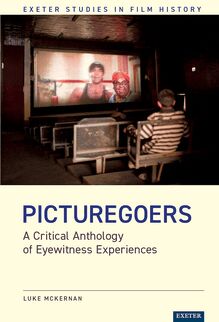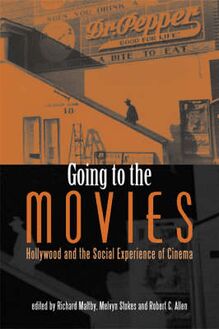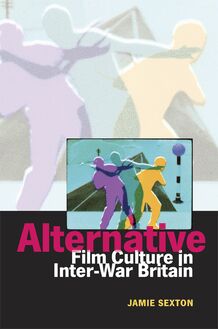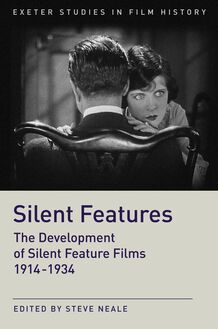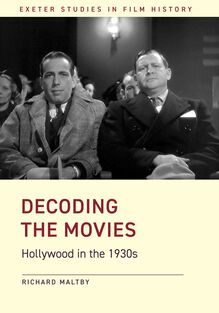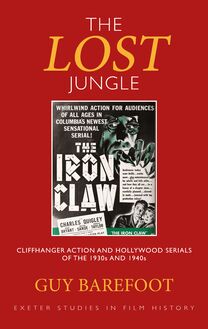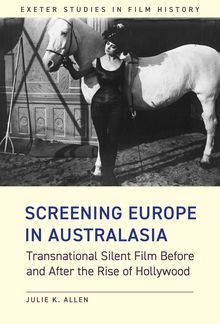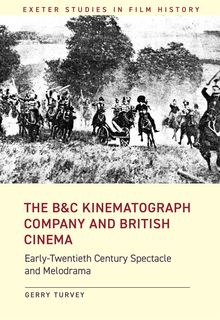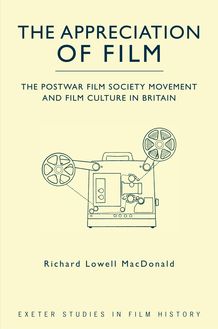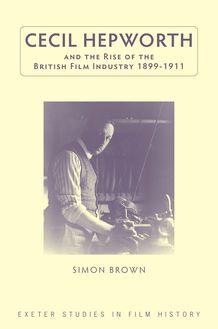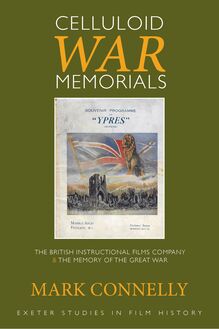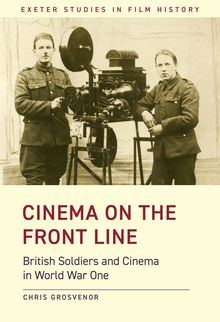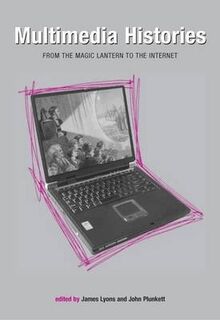Bill Douglas , livre ebook
155
pages
English
Ebooks
2022
Vous pourrez modifier la taille du texte de cet ouvrage
Obtenez un accès à la bibliothèque pour le consulter en ligne En savoir plus
Découvre YouScribe en t'inscrivant gratuitement
Découvre YouScribe en t'inscrivant gratuitement
155
pages
English
Ebooks
2022
Vous pourrez modifier la taille du texte de cet ouvrage
Obtenez un accès à la bibliothèque pour le consulter en ligne En savoir plus
Publié par
Date de parution
20 septembre 2022
Nombre de lectures
1
EAN13
9781804130254
Langue
English
This book examines the work and art of Bill Douglas, thirty years after his death.
Douglas made only a small body of work during his lifetime: The Bill Douglas Trilogy, based on his deprived childhood in Scotland; and Comrades, his epic on the Tolpuddle Martyrs; but he is acknowledged by many as one of Britain’s greatest filmmakers. His films inspire a depth of passion in those that have seen them, and interest in his work has intensified over the years, both within the UK and overseas.
This is the first work to examine Douglas’s life and career through archive material recently made available to researchers. Editors Amelia Watts and Phil Wickham have carefully selected a range of voices—both scholars and practitioners—to reappraise Douglas’s career from a variety of angles. The book raises important questions about Douglas’s status as an artist, and reflects on his struggles within the film industry of the 1970s and 1980s in order to consider the attendant difficulties of working within a collaborative and commercial medium such as cinema. The volume also explores the wider legacy of this film artist, through the collection on moving image history he assembled with Peter Jewell, which became the foundation of the Bill Douglas Cinema Museum. It will appeal to film students and scholars, and the small but committed group of general readers who are interested in Douglas’s work.
The book has a foreword by the renowned filmmaker Mark Cousins, who, like many other contemporary directors, is a great enthusiast for Douglas’s work.
List of Illustrations
Notes on Contributors
Acknowledgements
Foreword by Mark Cousins
Introduction PHIL WICKHAM AND AMELIA WATTS
DOI: 10.47788/BNMQ1583
PART I: BILL DOUGLAS IN CONTEXT
1. Bill Douglas and the British Film Industry during the 1970s and 1980s AMELIA WATTS
DOI: 10.47788/ORAD1934
2. The Bill Douglas and Peter Jewell Collection PHIL WICKHAM
DOI: 10.47788/LCOD8685
3. Bill Douglas’s Favourite film—Il Mare AN INTERVIEW WITH PETER JEWELL BY ANDY KIMPTON-NYE
DOI: 10.47788/JVKN9671
4. The Unseen Films of Bill Douglas ANDY KIMPTON-NYE
DOI: 10.47788/NIQE6697
5. Bill Douglas’s Working Papers AMELIA WATTS
DOI: 10.47788/PEJM9176
PART II: BILL DOUGLAS’S FILMS
6. His Ain Folk? ANDREW GORDON
DOI: 10.47788/QIRI6018
7. Exploring Questions of Theory and Practice within the Bill Douglas Trilogy JAMIE CHAMBERS
DOI: 10.47788/OWCS3651
8. True Comrades: Bill Douglas and Bertolt Brecht CARA FRASER
DOI: 10.47788/MNMN3566
9. Returning to Comrades DAVID ARCHIBALD
DOI: 10.47788/UUIE5434
PART III: BILL DOUGLAS’S LEGACY
10. Bill Douglas’s Critical Reputation and Legacy DUNCAN PETRIE
DOI: 10.47788/EBRX4961
Notes
Select Bibliography
Filmography
Index
Publié par
Date de parution
20 septembre 2022
Nombre de lectures
1
EAN13
9781804130254
Langue
English
Bill Douglas
Exeter Studies in Film History
Series Editors:
Richard Maltby , Matthew Flinders Distinguished Emeritus Professor of Screen Studies, Flinders University
Helen Hanson , Associate Professor in Film History at the University of Exeter and Academic Director of the Bill Douglas Cinema Museum
Joe Kember , Professor in Film Studies at the University of Exeter
Exeter Studies in Film History is devoted to publishing the best new scholarship on the cultural, technical and aesthetic history of cinema. The aims of the series are to reconsider established orthodoxies and to revise our understanding of cinema’s past by shedding light on neglected areas in film history.
Published by University of Exeter Press in association with the Bill Douglas Centre for the History of Cinema and Popular Culture, the series includes monographs and essay collections, translations of major works written in other languages, and reprinted editions of important texts in cinema history.
Previously published titles in the series are listed at the back of this volume
First published in 2022 by
University of Exeter Press
Reed Hall, Streatham Drive
Exeter EX4 4QR
UK
www.exeterpress.co.uk
Copyright © Amelia Watts, Phil Wickham and the individual contributors 2022
The right of Amelia Watts, Phil Wickham and
the individual contributors to be identified as authors of this
work has been asserted by them in accordance with
the Copyright, Designs and Patents Act 1988.
Exeter Studies in Film History
British Library Cataloguing in Publication Data
A catalogue record for this book is available
from the British Library.
https://doi.org/10.47788/QQIT1688
ISBN 978-1-80413-024-7 Hardback
ISBN 978-1-80413-025-4 ePub
ISBN 978-1-8041-3026-1 PDF
This book was published with the generous support of The Bill Douglas and Peter Jewell Endowment Fund.
Cover image: Bill Douglas with Michael Clark on the set of Comrades. Image © David Appleby and reproduced by kind permission.
Every effort has been made to trace copyright holders and obtain permission to reproduce the material included in this book. Please get in touch with any enquiries or information relating to an image or the rights holder.
Contents
List of Illustrations
Notes on Contributors
Acknowledgements
Foreword by Mark Cousins
Introduction
PHIL WICKHAM AND AMELIA WATTS
PART I: BILL DOUGLAS IN CONTEXT
1 Bill Douglas and the British Film Industry during the 1970s and 1980s
AMELIA WATTS
2 The Bill Douglas and Peter Jewell Collection
PHIL WICKHAM
3 Bill Douglas’s Favourite film— Il Mare
AN INTERVIEW WITH PETER JEWELL BY ANDY KIMPTON-NYE
4 The Unseen Films of Bill Douglas
ANDY KIMPTON-NYE
5 Bill Douglas’s Working Papers
AMELIA WATTS
PART II: BILL DOUGLAS’S FILMS
6 His Ain Folk?
ANDREW GORDON
7 Exploring Questions of Theory and Practice within the Bill Douglas Trilogy
JAMIE CHAMBERS
8 True Comrades: Bill Douglas and Bertolt Brecht
CARA FRASER
9 Returning to Comrades
DAVID ARCHIBALD
PART III: BILL DOUGLAS’S LEGACY
10 Bill Douglas’s Critical Reputation and Legacy
DUNCAN PETRIE
Notes
Select Bibliography
Filmography
Index
Illustrations
1 Jamie and Robert in Egypt from My Way Home , 1978
2 Bill Douglas demonstrates the praxinoscope. Bill Douglas interview by Charles Rees, 1978, Special Feature on Comrades DVD (BFI, 2012).
3 Menu card for the first private view of the Kinetoscope, 1894 (Bill Douglas Cinema Museum EXEBD 76927)
4 Bill Douglas and Peter Jewell with items from their collection (Bill Douglas Cinema Museum EXEBD 48469)
5 Press book from Il Mare (Bill Douglas Cinema Museum EXEBD 19153)
6 Bill Douglas in Rousdon , 1966
7 Gracemary scene in Berwick Street market, 1966
8 Bill Douglas in The Party at the Archer Street flat, 1966
9 Bill Douglas in Fever , 1967
10 Storyboard from My Way Home Production, BDC 1/TRI/1/3, (Bill Douglas Cinema Museum)
11 Comrades’ Storyboard, BDC 1/COM/1/4 – Plan Corridor Sc 95 (Bill Douglas Cinema Museum)
12 Comrades’ Storyboard, BDC 1/COM/1/4 – Plan Court Room Sc 95 (Bill Douglas Cinema Museum)
13 Jamie from My Childhood , 1972
14 Jamie from My Ain Folk , 1973
15 Jamie from My Way Home , 1978
16 Jamie from My Way Home , 1978
17 Jamie Prepares to ‘helter-skelter’ down the coalfield, My Childhood , 1972
18 Jamie’s expressionist anguish within Father’s Mother’s home, My Ain Folk , 1973
19 Street in Newcraighall. My Way Home , 1978.
20 Train Tracks. My Way Home , 1978.
21 Tommy dejected. My Childhood , 1972
22 Jamie dejected. My Childhood , 1972.
Contributors
David Archibald teaches Film and Television Studies at the University of Glasgow. His publications include the monographs The War that Won’t Die: The Spanish Civil War in Cinema (2012), Tracking Loach (2022), and essays on film and politics in numerous academic journals. David also makes films, the most recent of which include Drifting with Debord (2020), with Carl Lavery, and Comrades Together Apart / Camarades junts-i-a-banda (2021), with Núria Araüna Baró.
Jamie Chambers is a filmmaker, curator and Lecturer in Film and TV at Edinburgh College of Art (University of Edinburgh). He is founder of the Folk Film Gathering, the world’s first folk film festival, and director of the award-winning films When the Song Dies (2013) and Blackbird (2014). He is the founder and Editor-in-Chief of the Film Education Journal with BFI and UCL IoE Press and the director of the Scottish International Film Education Conference.
Cara Fraser is a final year Arts and Humanities Research Council funded doctoral student in Film Studies at the University of Dundee. Her main research interest is the German playwright Bertolt Brecht, and his influence on film. Her final and Master’s dissertations focused on French auteur Godard and American writer director Spike Lee, respectively. For her PhD thesis she turned closer to home: she has been researching Brecht and his Epic Theatre’s influence on British Art Cinema by examining the works of four British-based directors highly influential in their own right: Lindsay Anderson, Peter Greenaway, Richard Lester and, of course, Bill Douglas.
Andrew Gordon is a social and military historian who has written drama and short stories for BBC Radio. He has recently published biographies of Captain Denis Garstin MC and William Alexander Stanhope Forbes. He lectures on Cornish art and history and has compiled an extensive catalogue of the works of a major Cornish artist. He first discovered the work of Bill Douglas during a visit to the BFI and has carried out further research of the Trilogy during visits to Edinburgh.
Andy Kimpton-Nye has worked extensively as a television producer and director specializing in film-related documentaries. His work includes a series for BBC R4, In the Director’s Chair , exploring the lives and work of Luis Bunuel, Stanley Kubrick, David Lean and Orson Welles; one-off documentaries for FilmFour on Alan Clarke and Philip Glass; a series of short documentaries for Channel 4, Film Fever , looking at the fans of Julie Andrews, James Bond, Michael Caine, Carry On films, Hammer Horror and Laurel & Hardy; full-length documentaries for Sky Arts on Terence Davies, Bill Douglas and Derek Jarman; and numerous documentary extras for DVD releases from the BFI and UFO Distribution in Paris.
Duncan Petrie is Professor of Film and Television at the University of York. His books include Creativity and Constraint in the British Film Industry (1991), The British Cinematographer (1996) Screening Scotland (2000), Contemporary Scottish Fictions (2004), Shot in New Zealand (2007), Educating Film-Makers (2014) and Transformation and Tradition in 1960s British Cinema (2019). He is co-editor of Bill Douglas: A Lanternist’s Account (1993) and was director of the Bill Douglas Centre at the University of Exeter from 1996 to 2003.
Amelia Watts has recently completed her PhD at the University of Exeter, where her research focused on the British film industry in the 1970s and 1980s. Her project extensively examined the work of Bill Douglas, and utilizes his largely unseen Working Papers. She has guest lectured on Bill Douglas and The Bill Douglas Cinema Museum at the University of Glasgow and the University of Exeter.
Phil Wickham is the Curator of The Bill Douglas Cinema Museum at the University of Exeter. He also lectures in the film team at the university and has written extensively on British film and television. He was previously a curator at the BFI.
Acknowledgements
The editors would like to thank all the contributors to this book. We are very grateful to Mark Cousins for his foreword and to David Appleby for permission to use the cover photograph. Anna Henderson, her colleagues and readers at the University of Exeter Press have been extremely helpful throughout the process. We are especially thankful to Peter Jewell for all his support and generosity. This book is also in memory of Simon Relph, the producer of Comrades and an enthusiastic supporter of Bill Douglas’s work. When Simon died in 2016 there should have been a greater recognition of his huge contribution to the British film industry As we went to press we heard of the death of Mamoun Hassan, the other great figure that helped Bill Douglas in his career and a significant loss to British cinema; Mamoun and Simon made Bill’s films possible.
In addition, Amelia would like to thank Josh Norton-Cox, Teresa Sanders and Laura Baker for their support throughout this process. Phil thanks his family; colleagues, board members and volunteers at the Bill Douglas Cinema Museum; and especially Helen Hanson.
Foreword
How Many Ls are there in Wonderful?
Mark Cousins
Dear Bill Douglas,
There’s a new book about you. Three decades after you died, people are still writing about you. I’m writing a foreword to the book. This is the foreword.
The book has multiple writers. They look at your work and life
